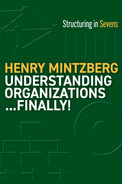CHAPTER 16
The Political Arena
Comedian Rodney Dangerfield used to quip: “I went to a fight the other night, and a hockey game broke out.” Conflict can be found in every organization—agendas vary, personalities clash, influencers seek a better deal. Any of these can flare up to engulf the place in politics. The most programmed machine, the most secure entrepreneur, the most established culture can be challenged, whether arbitrarily for advantage or because some fundamental condition has changed.

When conflict dominates, the organization can be described as a Political Arena, like a bunch of crabs clawing at each other in a bucket. All the legitimate forms of authority get displaced, suspended, or exploited, as political games abound. The conflicts can range from a focused confrontation to a free-for-all with skirmishes all over the place as various influencers pile in.
We are all aware of nation-states where chaotic politics took over, sometimes descending into civil war. In business, I heard about a family firm where two brothers—one in charge of production, the other sales—became so estranged that they ceased to speak with each other. You can imagine what happened in the rest of the place.
Conflict in an organization can develop gradually or flare up suddenly, often one followed by the other. Of course, simmering conflict is a lot more sustainable than outright hostility. (Witness the ongoing debates in your government’s legislature.) No organization can sustain itself as a full-fledged Political Arena, unless it operates in some artificially privileged position that covers its losses, such as a government agency with secure funding or a company with a monopoly position in the marketplace. I once served on a committee that tried to mediate a long-standing battle in our university between left and right wingers in the economics department. I visited their offices to have a look. Prominent on the door of one protagonist was a newspaper article about the dispute. It had been there so long it had turned yellow!
This chapter will be short, for several reasons. First, there is no need to describe the structure of this form, because the Political Arena has no structure, no formal structure at least. (Politics does have its informal structure— in those political games.) In fact, although one of the coordinating mechanisms is central to each of the other six forms, the Political Arena is characterized by the centrality of none. Coordination gets lost amid the battles.
Second, the cons of the Political Arena need little attention because they are widely appreciated, at least compared with the pros, which will be the focus of the rest of the chapter. And third, the Political Arena is often temporary—a stage more than a state—and thus will receive additional attention in Chapter 19, for the role it plays in some of the transitions between the forms.
The Pros of the Political Arena
Perhaps no question dominates the literature of organizations more than “How can we change this place?” The one answer I don’t think I have ever heard is “Make the place more political.” When the established forces of authority, expertise, and/or culture overwhelm an organization’s capability for change, politics may have to be the way forward. The organization has to be pulled apart before it can be put back together again. The Political Arena to the rescue!
We all know full well how divisive politics can be. Just as excessive culture can cause an organization to implode, so too can excessive conflict cause an organization to explode. What we must understand equally well, however, is that intense conflict can stop an organization from exploding as well as imploding. In Chapter 13, we considered the pros of politics in organizations. Here, we consider the pros of divisive politics that overwhelm an organization, two in particular.
First, when an established order of power has outlived its usefulness, a Political Arena that flares up may be able to remove it. In other words, intense conflict can sometimes be the only way to dislodge legitimate power that has become counterproductive—obsessive control, outmoded expertise, detached leadership, spent culture.
Hence, no matter how illegitimate its own power may be, the Political Arena can function as the functional bridge from one legitimate system of influence to another. Just as anarchists who lurk in every society may be able to foment revolution when large segments of the population have been repeatedly stymied, so too can politics, which lurks in every organization, be able to foment change that has been widely perceived as necessary but repeatedly stymied.
Second, the Political Arena can speed up the inevitable demise of a spent organization. While many small organizations in deep trouble simply disappear (as in the bankruptcy of a company), large ones have influential stakeholders—shareholders, managers, unions— who can act to sustain them, for example, by lobbying for government support. From society’s perspective, however, the sooner the demise comes, the better: political actors, like the scavengers that swarm over a carcass, can speed up the recycling of their useful resources.
I am no fan of organizational politics and have no wish to work in a Political Arena. (A taste of it once was more than enough.) But I do accept, and hope that I have persuaded you to accept, that this form of organization, like the others, has a constructive place in our societies. Organizational politics may irritate us, but it can sometimes serve us.
This completes the discussion of the seven forms alongside the seven forces. We turn now to how they play out.
